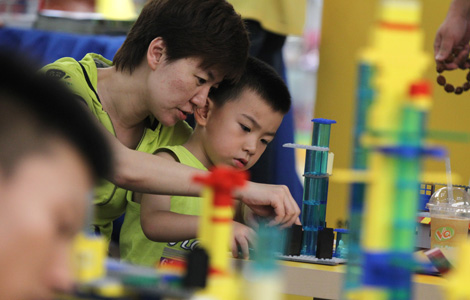An aging population leads to a university exchange
Updated: 2013-07-22 11:18
By Caroline Berg in New York (China Daily)
|
||||||||
China's aging population is exposing a serious problem in the country's health-care system, and a Chinese university is seeking the help of a nursing college in the US.
"This [partnership] developed because their population is growing so rapidly in the older adult section," Elizabeth Sefcik, professor at Texas A&M University-Corpus Christi's College of Nursing and Health Sciences, told China Daily. "Now they don't have enough daughters and sons to take care of their aging population."
Last week, a four-member delegation from Weifang University traveled to tour the Texas school's nursing and health facilities, as well as study its programs.
China's aging population problem is more severe than any other country in the world. The senior citizen population - those age 60 or over - is expected to leap from 185 million to 487 million by 2050, rising from 10 percent of the population to 35 percent, according to the China National Committee on Aging.
Traditionally, Chinese families were accustomed to a "three generations under one roof" model in which grandparents would move in with their children and grandchildren.
Today, Chinese families face a 4-2-1 phenomenon. In the single-child household, when the child reaches working age, he or she may have to care for two parents and four grandparents in retirement. This cultural shift exposes a huge lack and need for elderly assisted living in China.
"[China doesn't] have a workforce equipped to handle that need," Mary Jane Hamilton, dean of the College of Nursing and Health Sciences, said in a press statement. "Weifang [University] is trying to change that and we can help by providing their students with the type of specialized education needed to care for the elderly."
During the Weifang delegation's visit, an agreement was signed by both parties to allow the two schools to work together on degree programs, faculty and student exchanges, study abroad and collaborative research programs, seminars and workshops.
Weifang University, located in China's eastern Shandong province, wants to send 200 of its 12,000 nursing students to A&M-Corpus Christi to study nursing and get a bachelor's degree in nursing.
Hamilton said the Texas campus hopes to begin with 20 Chinese students and offer Internet courses to others, while implementing a plan to increase the number of students the program can accommodate over time.
The Texas college's master's degree in nursing program is ranked as one of the best online education programs by US News & World Report and is the fourth-largest such program in the state.
Hamilton said the college has a very sophisticated simulation center, which the delegation toured. The college has developed exercises that allow students to care for electronic simulators.
"Students learn to care for patients [through these simulators]," Hamilton said. "The student has to make very rapid decisions based on what's happening in the clinical area at that point in time."
For example, one thing that can happen is the student gives a patient morphine through an IV, which may make the simulator's respiration drop, become unresponsive and potentially die. "There are a lot of critical thinking scenarios that you can simulate and we have a very prescribed way in which we do that," Hamilton said. The dean said all simulation exercises are recorded and students critique them afterward with a faculty member.
"I think the Chinese delegation was very interested in that portion," Bunny Forgione, associate dean at the College of Nursing and Health Sciences, told China Daily. "We had a simulation going on and they were in there listening to the students and faculty interact, and they were filming it and asked for the materials to take back with them."
Hamilton told China Daily she is excited for the cultural exchange that is bound to occur through this geriatric certificate program, which she said she expects will be ready within 18 months.
carolineberg@chinadailyusa.com
(China Daily USA 07/22/2013 page2)
Most Viewed
Editor's Picks

|

|

|

|

|

|
Today's Top News
Woman jailed in Dubai after reporting rape
Guangdong to probe airport bomber's allegations
Police meets GSK representative after scandal
US protests demand 'justice for Trayvon'
6.6-magnitude quake hits NW China
Minister rules out stimulus package
Top Chinese admiral to visit US this year
Victory improves Abe's hand
US Weekly

|

|














